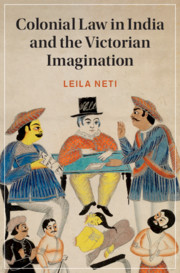Book contents
- Colonial Law in India and the Victorian Imagination
- Cambridge Studies in Nineteenth-Century Literature and Culture
- Colonial Law in India and the Victorian Imagination
- Copyright page
- Dedication
- Contents
- Acknowledgments
- Introduction
- Part I Criminality
- Part II Temporality
- Part III Adoption and Inheritance
- Chapter 5 The Begum’s Fortune
- Chapter 6 Foundlings and Adoptees
- Afterword
- Notes
- Bibliography
- Index
Chapter 6 - Foundlings and Adoptees
Filiality in the Novels of George Eliot
from Part III - Adoption and Inheritance
Published online by Cambridge University Press: 02 April 2021
- Colonial Law in India and the Victorian Imagination
- Cambridge Studies in Nineteenth-Century Literature and Culture
- Colonial Law in India and the Victorian Imagination
- Copyright page
- Dedication
- Contents
- Acknowledgments
- Introduction
- Part I Criminality
- Part II Temporality
- Part III Adoption and Inheritance
- Chapter 5 The Begum’s Fortune
- Chapter 6 Foundlings and Adoptees
- Afterword
- Notes
- Bibliography
- Index
Summary
The sixth chapter continues this focus on the theme of adoption by considering the portrayal of orphans and foundlings in the ‘adoption’ novels of George Eliot. At a time when questions of filial dependence or entitlements were being rigidly regulated in the colony, writers from Charles Dickens to Charlotte Brontë and George Eliot imbued adoptive relations with special sentimental and social value to expansively reform ideas of how family, home, and kinship are understood. So, for instance, this chapter shows how Eliot’s Silas Marner (1861) champions the surrogate parental relation over wealth and property inheritance precisely when the Sumroo case legally restricts these ties in the Indian context. Yet, even for Eliot, when adoption raises the specter of racial or national difference as in Daniel Deronda (1876) kinship remains ancestral, its hallmark being genealogical and not open to the caprice of nurture. What this chapter thus clarifies is a contrapuntal relationship between law and literature around the question of adoption. Some of the most celebrated nineteenth century English novels use adoption to break with the family romance plot, upending legal assumptions about rights and descent. However, race proves a limit point even for these works with otherwise capacious imaginations.
Keywords
- Type
- Chapter
- Information
- Colonial Law in India and the Victorian Imagination , pp. 176 - 208Publisher: Cambridge University PressPrint publication year: 2021



